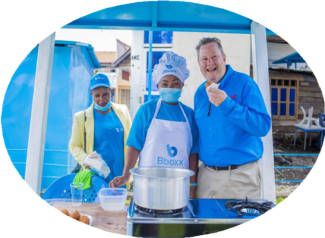USAID is supporting the innovative, technology-led initiative to reduce charcoal-related deforestation around Virunga National Park in the Democratic Republic of the Congo (DRC) in partnership with BBOXX Ltd. In the DRC, energy demand drives 94 percent of wood harvesting. Consumption of charcoal increased in cities because of population growth, lack of livelihood alternatives, high unemployment rates, and low enforcement of forest management legislation. Virunga National Park, in eastern DRC, lost 37,400 hectares (ha) of forest (around 4 percent of the park) during the last 18 years, with deforestation concentrated close to the major urban centers of Beni, Butembo, and Goma. Adjacent to Goma, the south sector of the park has lost 13,000 ha of forest, about 11 percent of total surface area. The south sector of the Virunga registered a loss of 3,550 ha in 2018 alone, about 3 percent of surface area. In 2019, BBOXX analysis on charcoal consumption in and around Goma concluded that 91 percent of deforestation in the southern sector is due to charcoal production.
Alternatives available and currently used around Goma, such as improved cookstoves, failed to demonstrate a clear impact on reducing deforestation in the park. In the specific case of using Liquified Petroleum Gas (LPG), barriers to adoption in the East of DRC are significant and include i) the upfront investment required in cookers and canisters, ii) a mismatch between purchase patterns and income patterns, iii) concerns over the safety of the fuel, iv) inconvenience due to heavy canisters, and v) a lack of availability and awareness. The objective of this project is to promote LPG within the East of DRC, especially Goma and Bukavu by tackling these barriers.
USAID’S SUPPORT
At the center of this activity is the “customer management software with Tag & Trace cylinders” which ensures the highest level of safety by recording home installation for customer education, managing home delivery, and cylinder quality check at every refill.
The customer management software with Tag & Trace cylinders offers customer asset financing which removes the biggest obstacle to adoption of LPG by households at scale: affordability of the equipment.
Through customer management with Tag & Trace and offering asset financing, the activity will overcome existing barriers to the adoption of LPG, thus making it an accessible and affordable alternative to charcoal. In particular:
- Affordability: Consumers benefit from the usual gas prices, with the costs of the cooker, canister, and delivery service included in the purchase price, and even have the option of paying on an installment loan model
- Safety: LPG canisters, cookers, and peripherals are regularly maintained, serviced, and replaced by BBOXX to assure customers of safety
- Availability: Potential gas consumers are coached on how to cook with gas and transition from charcoal by a dedicated all-women gas cooking team
- Awareness: Potential gas consumers are made aware of services by an extensive distribution network.
BENEFICIARIES
- This project will directly benefit the southern sector of Virunga National Park, where charcoal production is responsible for 91 percent of deforestation.
- Over the 3-year duration of the project, BBOXX aims to reach 30,000 households in the Kivu region of the Democratic Republic of Congo with LPG, averting Carbon dioxide (CO2) emissions totaling 40 tons CO2 equivalent.
- The LPG activity expects to improve security in the Kivu region by weakening the damaging and corrupt charcoal value chain.
KEY ACCOMPLISHMENTS
- A total of 8,065 customers have added LPG as an alternative for cooking, including 4,186 active customers (with a consumption of more than 3 kg of gas per month) in the city of Goma by the end of Aprill 2022
- Reduction of charcoal use by 34% in households that have adopted gas as an alternative
- Appropriate authorizations obtained by Bboxx to become gas distributor in DRC
- Baseline studies conducted: household charcoal consumption and charcoal supply chain
- Other relevant studies finalized: Political economy analysis (PEA) of the charcoal sector and Charcoal monitoring market status in the Goma city
For more information:
https://www.usaid.gov/central-africa-regional and https://danube.umd.edu/content/home.
Please contact:
CARPE Office: kinshasacarpe@usaid.gov
Louis de Muylder: l.demuylder@bboxx.co.uk
Xavier Carbonel: x.carbonel@bboxx.co.uk

